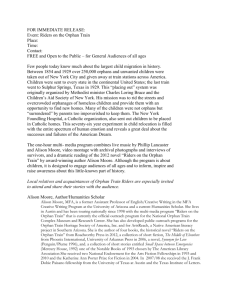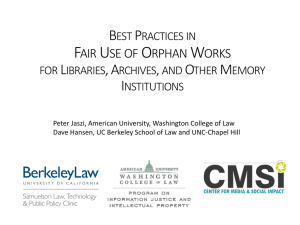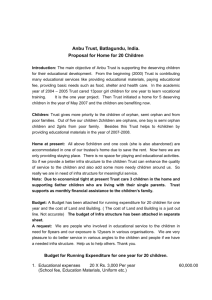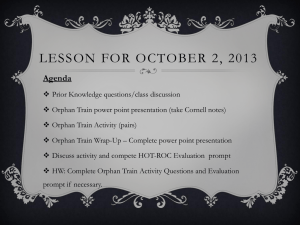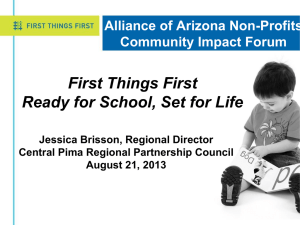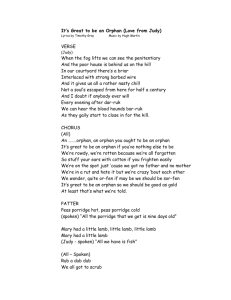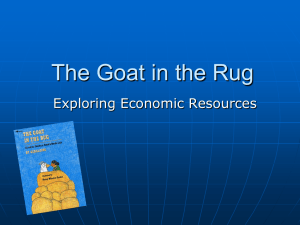MedlinOrphanStudentPPT - Arizona Geographic Alliance
advertisement
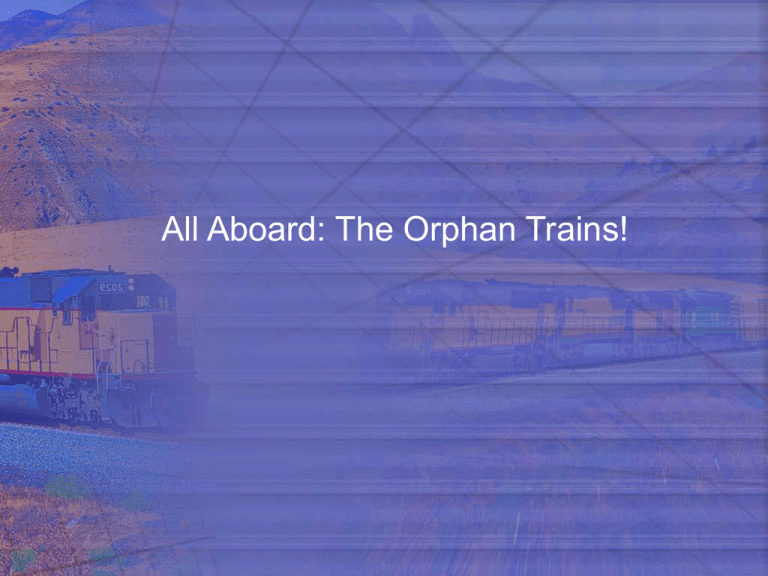
All Aboard: The Orphan Trains! Take a Trip! • You are going on a very looooong trip and are going to be gone a looooong time. With an assigned partner, you will list items you would bring. I can’t tell you where you’re going… • You cannot talk, add one item to the list and pass it to your partner. You may not repeat items already on the list. The Rules Have Changed! • You are now MOVING to a new location. I can’t tell you what the climate is like there because I don’t know where you’re going. • Using your same list, you will need to prioritize the items you have chosen because you are only allowed a small “carry-on” size suitcase. • Pass the paper back and forth the same way as the first list, but this time you can either circle an item already written or add something new. Don’t exceed your allowed space! Orphan Train Background Info • During the 1800s there were many homeless or orphaned children on the streets of New York City. They did anything they could to survive including stealing and begging. It was hard figuring out what to do with them, so a few organizations came up with the idea to send them westward and place them with new families. For some, this worked well, but for other children, things weren’t that great. Children were especially wanted to do hard labor in the fields or home. • Waif: a child who has no home or family Children’s Protest Parade: They want better homes (New York) • And the Arizona Story… • No children were placed by the Children’s Aid Society in Arizona. However, another part of the orphan movement happened when an orphanage run by Catholic nuns placed their wards in the state. In 1904 Irish children traveled from New York City to the mining towns of Clifton and Morenci in Arizona. The nuns placed 40 children into Catholic families in Clifton/Morenci. Anglo residents noticed that the nuns were placing Anglo children with Mexican families and they became very angry, even though the Mexican families were the Catholics in the area. It didn’t take long for the Anglo community to be in an uproar and the townspeople formed a vigilante group that kidnapped the children from their new homes and took them by force. The group placed the 40 children into Anglo families even though they were not of the same religion. The nuns later fought in court for the children to be returned because they wanted to take the children back to New York City and felt responsible for the children. The U.S Supreme Court sided with the vigilantes based on issues of race. PLACEMENT OF ORPHAN TRAIN RIDERS Directions: On your railroad map of the U.S., you will use an atlas to locate the 5 US cities below. Mark them with dots on your map. Label the dots using the city names. Create a legend on the map. Draw five boxes for the 5 travelers using a different color for each one. Trace/draw the route from New York City in the corresponding color showing where each orphan would travel. Colors may overlap. If the city does not quite go by a railroad track, assume the rest of the journey was made by another form of transportation. Traveler Destination Alice Ayler Kansas City, Kansas Arthur Smith Clarinda, Iowa Lorraine Williams Kirksville, Missouri Lee Nailing Clarksville, Texas Arizona riders Clifton, Arizona Letter to New York City Prompt: You are to take on the role of one of the children travelers. Pretend you are that child and write a friendly letter back to your case worker (Mr. Brace) about your new home. Reread the parts of the newspaper article about your traveler so you can remember where you are and a few details you can include. If you are unsure of the entire situation, you can use your knowledge of what rural life was like at that time to come up with ideas. If you choose to be an Arizona rider, you can make up your own name. Mr. Brace needs to know specific details about your life. Be sure to include the following: – – – – – Your name Your new town/location How your family is treating you How you get along with your family What activities you do during the day (farm work, schooling, housework, etc…) – Whether you agree with the decision to be sent on the Orphan Train

